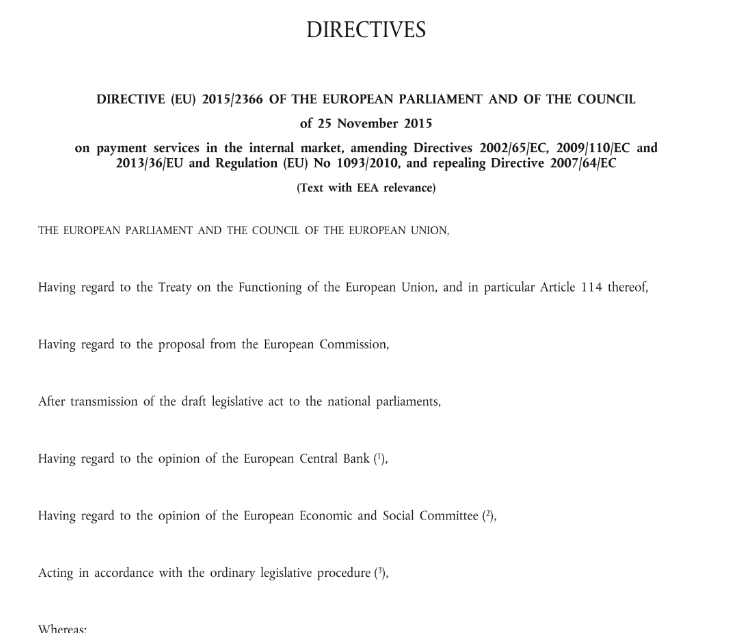|
It’s not unclear that policy makers around the world want to see new models to serve and add value to the end-users in finance. They’re not against increased transparency either. In Europe, the European Commission’s Executive Vice President Valdis Dombrovskis announced last week it’s considering introducing ‘EU passporting’ for FinTech companies. Passporting is the concept of having ‘finance standards’ from one EU territory to another for maximum compatibility and transferability. Separately, the Commission also moved to prevent large fees imposed on money transfers within the EU, affecting mainly established banks and agents where most fees are present. Combined with new business models, client demand and policy changes, these will catalyze technology adoption and push the pace of transition within financial services. PSD2, GDPR, MIFID2 – The Barrage of Acronyms Attack The policy is moving in one direction. Markets are moving toward efficiency. Client demand is pushing end-user value and control over their personal affairs, such as data. Alone, all these trends have uncertainties regarding practical implications and are open to interpretation, yet as a whole, they represent a leg of a changing competitive market. New entrants are effectively sprung from the same fabric as these new policies and likely see these policies as natural and a secondary element of driving end-user value. However, those who bear 200 years of tradition and a deeply rooted track record in the financial services market fundamentally have to adapt. Policy Changes in Europe With Global Implications The European Union is still the world’s largest single market and guaranteeing access to the single market is a crucial tenet of belonging to the union. Fragmentation has plagued Europe in the past, which can be seen as a clear inhibitor to the progress also in the digital finance market. I wrote about this already as early as 2013 after speaking in front of the European Commission in Brussels. Even since then, it has not changed because the fragmentation is innate to the single market. While the European Union is where much of this policy originates, it’s not the only area these changes are happening and manifesting themselves. FinTech and challenger organizations are creeping up from the US, the Middle East, Southeast Asia and practically everywhere. Where the establishment is strong, the challengers clearly focus on providing superior value and service than the existing service providers. Incumbents are rolling out open APIs to core banking services around the globe, such as BBVA’s API Market. Where it gets interesting, however, is where services do not exist and challengers get to define the future of how modern financial services look. Just look at how online wealth managers (robo-advisors) have taken off in China, where a large market segment previously only had their deposit banks and the stock market as the places to place their capital. By definition, the two are at extreme ends of the market with nothing in between, until now. The growth has been exponential and the technology sector often looks to China as a benchmark on how future services will function. New Operating Models Push Pace of Change Lowering costs of operations is a particular core tenet of FinTech companies. It’s also their competitive advantage in most cases, where they can provide valuable services in a more modern way using automated technologies and artificial intelligence in decision-making. If a challenger bank can onboard a new user in under 8 minutes, how can a traditional bank achieve the same efficiency and user experience? Further, this means the lowering of margins particularly forces adaptation of technology in the incumbent sector, where costs of operations and of staying compliant are rigorous, which ultimately are passed onto the end-user in the form of fees. If the fees are set to change, which seems evident from announcements like the one from the European Commission, the cost structure needs to be amended. A recent PWC report wrote about the importance of branches to customers. While we can speculate if the established ways of servicing clients are in fact more valuable than what the technology sector often gives credit for, I would argue this is nothing more than a manifestation of the ‘what I see is all there is’ cognitive bias, that is mistaking the observed universe for the total universe. The fact is that most people till date have experiences with branches and most do not have experience with a mobile app as a bank. Existing institutions are finding new ways to serve clients, where models embrace end users interests and allow them to be in control, e.g., where their data is used. New standards are being set daily and they will have to move faster than ever. This article was first published on letstalkpayments.com. |
AboutEst. 2009 Grow VC Group is building truly global digital businesses. The focus is especially on digitization, data and fintech services. We have very hands-on approach to build businesses and we always want to make them global, scale-up and have the real entrepreneurial spirit. Download
Research Report 1/2018: Distributed Technologies - Changing Finance and the Internet Research Report 1/2017: Machines, Asia And Fintech: Rise of Globalization and Protectionism as a Consequence Fintech Hybrid Finance Whitepaper Fintech And Digital Finance Insight & Vision Whitepaper Learn More About Our Companies: Archives
January 2023
Categories |





 RSS Feed
RSS Feed
